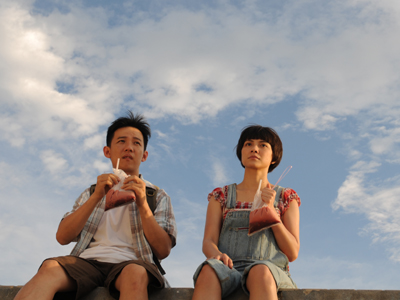 |
Large Medium Small |

Chinese-Malaysian singer Aniu saw Zhang Yimou’s To Live (Huo Zhe) when he was in high school and decided to make film-directing his life’s goal. He has finally fulfilled his dream with his directorial debut Ice Kacang Puppy Love being screened in Malaysia in April and all set to premiere in China in late July. Ice kacang is a popular Malaysian dessert, traditionally made with shaved ice and red bean.
Totally different from Zhang’s harrowing epic, Aniu’s maiden work is a warm flick about youth dreams and friendships in a small town.
“I want to live as a teenager once again through the film,” says Aniu.
The 34-year-old singer went back to his hometown to find a suitable setting, only to discover the place transformed by modern architecture and urban development.
He then looked elsewhere across peninsular Malaysia before settling on a town named Tronoh in the state of Perak. A tin mining town, many of its residents left with the decline of the industry in the mid-20th century, leaving many old buildings intact.
“Even so, the town slowly disappeared over the course of the film’s shooting,” he says.
The film is set in a traditional Malaysian café. The main protagonist is Botak, played by Aniu. He works in his father’s café and is in love with a girl living upstairs.
“A café is the facebook for Malaysians,” Aniu says. “Most of them are run by Chinese. All kinds of people, from housewives returning from the market to workers ready to go to work, gather in cafés to chat.”
Aniu reveals that not everything in the café was old. “Its wooden bar counter, for example, had to be remade,’’ he says.
“Now at least one film will show what old Malaysian small towns looked like,” he adds happily.
Aniu spent seven years writing the screenplay. At first, he set his sights high hoping to show the history of Malacca, a Malaysian city with a history of some 600 years. Later, while traveling in the ancient town of Wuzhen in China’s Zhejiang province, the guide told him the stone-paved road on which he was walking was 900 years old.
“I was shocked,” he laughs. “I realized maybe I should be down to earth and make something I have true feelings for.”
His music background came in handy, says the first-time director.
“The actors are so good that I could not cut their parts. So I add beautiful scores to the long takes,” he says.
He also reveals that before shooting any scene, what jumped into his mind was the melody, and this helped him with the scene’s composition, lighting and mood.
For instance the scene that shows two lovers sitting on a trestle in the sunset with their feet in water, was inspired by a love song popular in 1989.
Filmmaking has also made him cherish his music career more. “The life of a director is much tougher,’’ he says.
The challenges of making films, especially for a new director, are many, with the most difficult being raising the money.
Aniu pledged his house and spent 4 million yuan ($590,400) out of his own pocket on the film, made on a budget of 8 million yuan. The pressure was overwhelming, says Aniu, recalling just 10 days of good sleep over the 20 months of shooting.
He studied many successful blockbusters such as Raiders of the Lost Ark and the James Bond movies to learn about their tempo and narrative styles.
To make the film more appealing, he invited an all Chinese-Malaysian starcast, including veteran actress Angelica Lee, singer Fish Leong, Gary Chaw and Victor Wong.
But it was not easy to convince their agents to let them act in a maiden work. Fortunately, most of the stars were keen on this Chinese-language film, a rarity in Malaysia. Fish Leong even secretly tipped Aniu on how to negotiate with her agent.
Lead actress Angelica Lee, voted best actress at the Taiwan Golden Horse and Hong Kong Film Awards, earned the nickname “professor’’ from the cast and crew for her long lectures on acting and filmmaking.
“She told us a film is like a mountain. Viewers only see the peak, but its foundation is made solid by teamwork,” Aniu recalls. “The trust and support of the crew is what helped me face all the hardships and complete the film.”
The film earned 8 million yuan in two weeks in Malaysia in April, an amount in a country which sees few films about the 7 million Chinese living there.
Aniu is not sure whether the box office in China will be equally satisfying, but he believes that it is not the only measure of success.
“I remember back in Malaysia one day in the restroom, a stranger came to me and said, ‘I know you, your film is good’. I was so proud!”